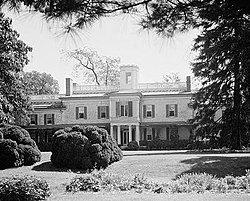Doughoregan Manor
|
Doughoregan Manor
|
|

Doughoregan Manor, 1936
|
|
| Location | Manor Lane, Ellicott City, Maryland |
|---|---|
| Coordinates | 39°16′36″N 76°53′35″W / 39.27667°N 76.89306°WCoordinates: 39°16′36″N 76°53′35″W / 39.27667°N 76.89306°W |
| Built | est. 1727 |
| Architect | Unknown |
| Architectural style | Greek Revival |
| NRHP Reference # | 71000376 |
| Added to NRHP | November 11, 1971 |
Doughoregan Manor is a mansion located on Manor Lane near Ellicott City, Maryland, United States. It was designated a National Historic Landmark on November 11, 1971.
Doughoregan Manor is a pre-colonial manor house built in the early 18th century. The slave plantation was founded on 7,000 acres patented to Charles Carroll I as "Doughoreagan" (sometimes spelled Doororegan) named for a family estate in Ireland, in 1702, and expanded to 10,000 acres as "Doughoreagan Manor" in 1717. The Georgian brick plantation house, built by Charles Carroll II around 1727, was enlarged and remodeled in 1832 by Charles Carroll V in the Greek Revival style.
From 1766 to 1832, Doughoregan Manor was the country home of Charles Carroll of Carrollton, (Charles Carroll III) last surviving signer of the Declaration of Independence. He lies buried in the chapel attached to the north end of the mansion. Notable guests that have visited the manor include George Washington, Thomas Jefferson, John Adams, John Hancock, Benjamin Franklin, James Monroe, and Marquis de Lafayette. In 1861, the manor became the home of John Lee Carroll, who became Governor of Maryland.
In its current configuration the Manor is a brick, two-storied, U-shaped building. The roof is in gabled sections, some with balustraded decks, and in the center is an octagonal cupola. The front center entrance has a one-story tetrastyle Doric portico and is similar to the rear portico. The chapel and kitchen are attached to the main block by hyphens.
...
Wikipedia


